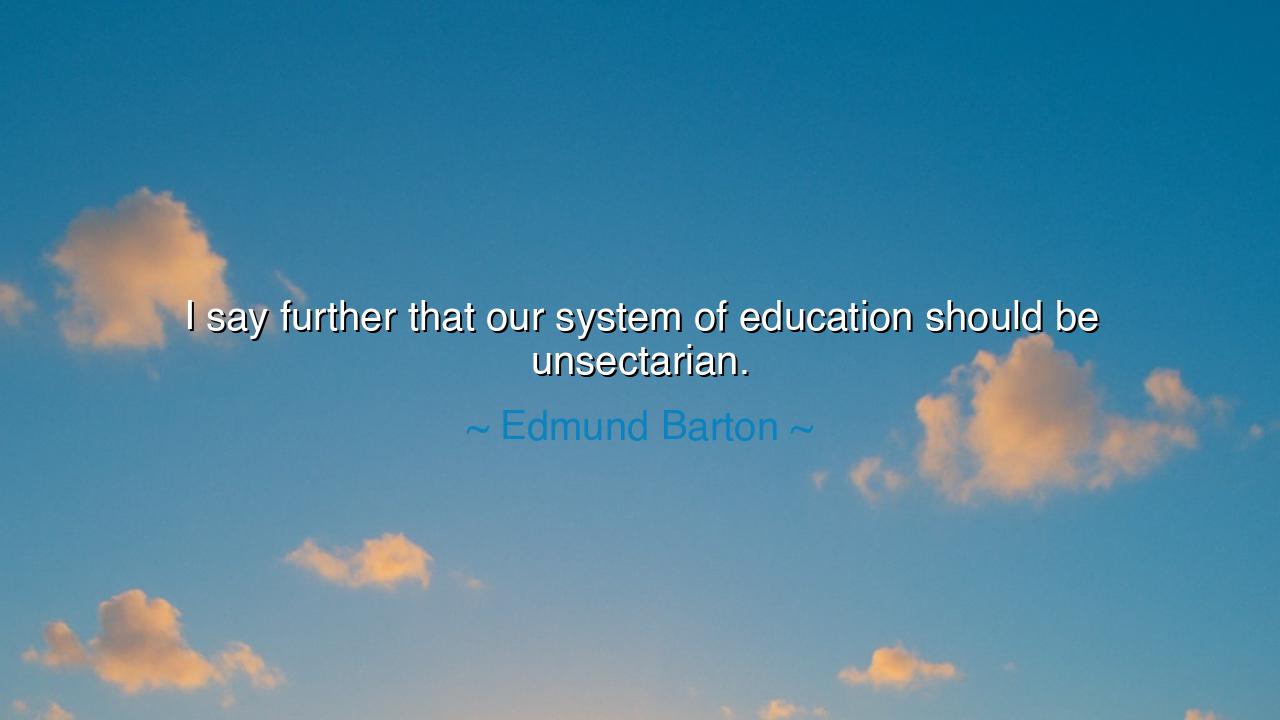
I say further that our system of education should be unsectarian.






Hear the words of Edmund Barton, the first Prime Minister of Australia, who helped bind together a young nation under the banner of federation. He declared: “I say further that our system of education should be unsectarian.” These words, though spoken in the heat of political debate, shine with a principle as old as civilization itself—that the light of knowledge must belong to all, not be divided by the walls of creed. For true education is the inheritance of every child, not the possession of one sect or one faith alone.
What did Barton mean by unsectarian? He meant that schools should not be the battlegrounds of competing doctrines, where children are taught not truth but division. He spoke at a time when nations wrestled with the influence of churches upon public education, and when the question of whether schooling should be tied to religion was fierce upon the lips of many. Barton, in his wisdom, declared that if a nation was to be strong and united, its education must be broad, free from narrow sectarian strife, so that every child, regardless of heritage or faith, might learn together.
For education is the great equalizer. It must not sow division but cultivate unity. If schools are bound to sectarian lines, then children grow apart, mistrusting those of different faiths or none at all. But if schools are unsectarian, teaching knowledge, virtue, and civic duty without forcing religious allegiance, then the seeds of tolerance and respect are sown. Thus, Barton’s words echo the wisdom of statesmen who knew that nations cannot stand divided against themselves.
History gives us proof of this. Consider the struggles of Europe after the Reformation, where sectarian schools became instruments of division. In many lands, Protestants and Catholics built separate systems, and their children grew apart, carrying suspicion into adulthood. Contrast this with the vision of America’s founding fathers, who, though many were religious men, built public schools upon unsectarian lines. Thomas Jefferson himself declared that education should be universal and free, not bound to the teachings of one denomination. In this way, a diverse people could still be united under one civic fabric.
Barton’s vision also looked to the future of Australia. A nation newly born, composed of peoples from different lands and creeds, could not afford to fracture itself with sectarian rivalries. Its children needed schools where the son of a Catholic, the daughter of a Protestant, the child of a freethinker, could sit side by side and learn the common truths of history, science, and citizenship. By removing sectarian barriers, Barton sought to strengthen not only the individual mind but the national spirit.
The wisdom of his words is enduring: education must serve truth, not faction. Religion has its place in the home and the church, but the school must be a sanctuary for all, a place where children are united by knowledge, not divided by doctrine. An unsectarian education builds tolerance, prepares citizens for democracy, and protects the freedom of conscience for every soul.
Therefore, O listener, take this teaching to heart. In your own life, do not allow learning to be chained by prejudice. Seek knowledge from all sources, but do not impose it as a weapon against others. If you are a parent or teacher, strive to create spaces where truth is taught with humility and respect, not as a tool of division but as a bridge of unity. For education, when it is truly unsectarian, becomes not only the light of the mind but the bond of society.
And so, remember Edmund Barton’s words: a nation rises not by dividing its children into camps of sect and creed, but by uniting them in the shared pursuit of wisdom. Let education be that shared path, unbound by sectarian chains, and the generations to come shall inherit not only knowledge, but peace.






AAdministratorAdministrator
Welcome, honored guests. Please leave a comment, we will respond soon